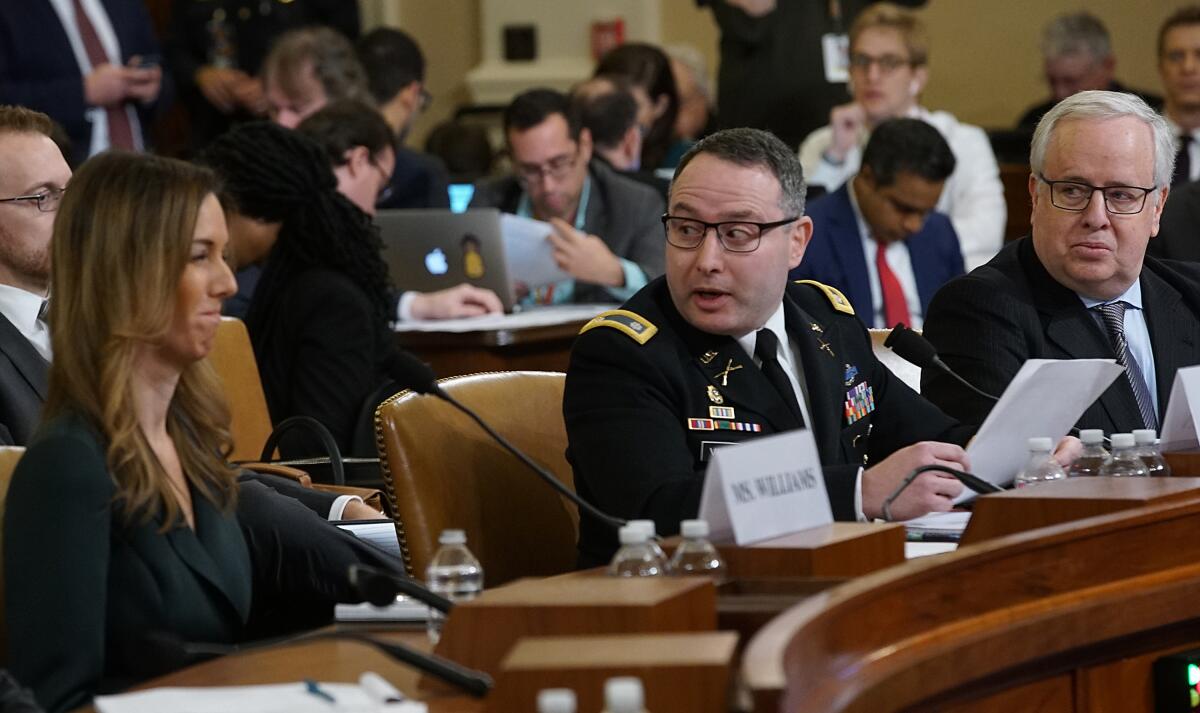Trump scandals are rich pickings for D.C. lawyers

WASHINGTON — Michael Volkov ran his client, Lt. Col. Alexander Vindman, through a “murder board” in preparation for his recent testimony under the glare of TV lights in the House impeachment hearings.
Over more than a dozen intense days, Volkov and Vindman reviewed facts, dates and conversations and practiced answering meandering or bellicose questions from lawmakers.
As a final touch, the attorney tried to rattle the decorated Army officer and National Security Council staff member. Glaring menacingly over reading glasses, Volkov launched a harangue.
“I pulled my best Jim Jordan,” Volkov said, referring to the Ohio Republican known for his rapid-fire, high-decibel questioning of witnesses. “But I couldn’t throw him off. That is what you have to do in cases like this.”
Their labors paid off: Vindman came across as knowledgeable and unflappable in his Nov. 19 testimony to the House Intelligence Committee, part of the Democratic-led chamber’s impeachment inquiry into President Trump’s efforts to pressure Ukraine to launch politically beneficial investigations.
For lawyers like Volkov, the impeachment proceedings provide the latest in a string of high-profile investigations that over the last few years have been a boon for Washington’s criminal defense bar.
Whether representing witnesses in the special counsel investigation into Russian meddling in the 2016 election, probes into scandals at various federal agencies or the Hillary Clinton email saga, white-collar defense attorneys in Washington say they have never been this consistently busy.
Such inquiries require a specialized blend of skills — finesse and the ability to navigate the intersection of law and polarized politics in an age in which social media amplifies every comment, mistake and accusation.
Lawyers for witnesses said much of their time has been spent helping clients navigate that fraught partisan landscape.
“This isn’t like answering questions in a witness box next to a federal judge,” said Ken Wainstein, a former top Justice Department official who represents a staffer at the U.S. Embassy in Kyiv, the Ukrainian capital.
“In situations like this, you spend a lot of time preparing for the political lines of attack and anticipating the political agenda behind them. You want to make sure your answers cannot be intentionally or unintentionally misconstrued for political purposes.”
While such investigations often raise a lawyer’s profile, they are generally money losers. Most government witnesses are either reimbursed by their agencies or through insurance programs that cap payments at about $300 an hour, far short of rates that can exceed $1,000 an hour.
“We do not make money on these types of cases,” said Charles Cooper, a legend in conservative legal circles who represents one of the impeachment investigation’s most sought-after witnesses, John Bolton, the former national security advisor.
“They take a lot of time,” Cooper said. “They require extensive preparation.”
Barbara “Biz” Van Gelder represents two clients who have been questioned by House lawmakers: Timothy Morrison, the former senior director for Europe and Russia on the National Security Council, and Mark Sandy, a career employee at the Office of Management and Budget.
As a former federal prosecutor, Van Gelder said, she felt compelled to help government workers.
“If you are served with one of these subpoenas,” she said, “it can be a daunting process, especially on a government salary.”
Her clients, she said, were caught in a tough situation: Congress was demanding they testify; the White House was telling them not to show up.
Van Gelder counseled Morrison and Sandy that based on her reading of the law, they should appear if subpoenaed. She would fight back if questions strayed into areas of executive or other privileges.
During Morrison’s closed-door deposition last month, Van Gelder fended off questions about his conversations with the president, arguing that such queries would have to be litigated in court on a question-by-question basis, according to a transcript of the proceeding. “At this point it’s a hard stop,” Van Gelder told Rep. Adam B. Schiff (D-Burbank), chairman of the committee, cutting short one line of inquiry.
Van Gelder and several other lawyers said the impeachment proceedings were especially daunting because the White House and agencies would not grant lawyers or Congress access to witnesses’ notes, emails, records and call logs. The House was also working very quickly, she and other lawyers said.
Morrison had two weeks to prepare for his deposition and only a few days to review the transcript of that testimony before his public hearing on Nov. 20. Sandy had even less time — 11 days to prep for his deposition, she said.
“In cases like this,” Van Gelder said, “you are always sitting beside your client or behind your client and thinking, ‘I wish I had a few more hours to prepare.’ But you have to rely on your instincts and get them as prepared as you can.”
Lee Wolosky, an attorney for Fiona Hill, the NSC’s Russia expert, said he had never faced a situation so harried.
In the days before her public hearing, Wolosky and Hill were watching live television coverage of impeachment testimony. “The ground was shifting even as we were preparing,” he said.
Volkov and Vindman tried to leave nothing to chance. As they reviewed depositions that seemed to be released daily by Democrats, Volkov surmised that Republicans would pounce on Morrison’s closed-door testimony that he had concerns about Vindman’s judgment. Morrison had testified that Hill had similar worries.
When Jordan pressed Vindman at his public hearing about Morrison’s critique, Volkov was ready. The attorney slid Vindman a piece of paper. It was a performance review, signed by Hill.
“I guess I’ll start by reading Dr. Hill’s own words,” Vindman testified, looking down at the evaluation.
“She attested to, in my last evaluation that was dated middle of July right before she left, ‘Alex is a top 1% military officer and the best Army officer I’ve worked with in my 15 years of government service. He is brilliant, unflappable and exercises excellent judgment.’”
Jordan immediately shifted to another line of questioning.
“It was a beautiful moment,” Volkov said.
More to Read
Get the L.A. Times Politics newsletter
Deeply reported insights into legislation, politics and policy from Sacramento, Washington and beyond. In your inbox three times per week.
You may occasionally receive promotional content from the Los Angeles Times.











